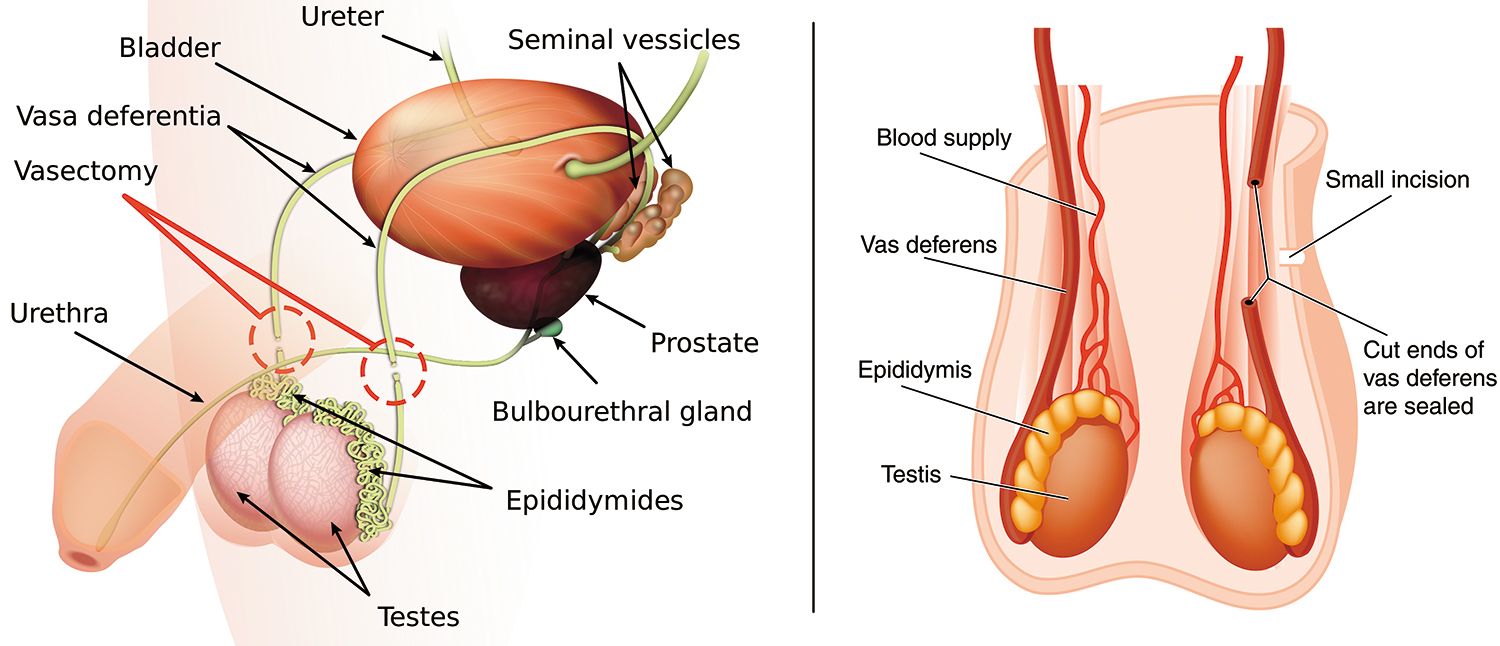Vasectomy

A vasectomy is a permanent form of contraception. It involves a simple surgical procedure that prevents sperm from traveling from the testicles to the semen ejaculated from the penis. After vasectomy, your semen is the same, but it has no sperm in it. Vasectomy is a safe, effective, and permanent form of contraception.
How effective is vasectomy?
A vasectomy is over 99% effective. However, while it is rare, a vasectomy may fail, and you may stay fertile or become fertile again. This can happen if the tubes are not entirely blocked off, grow back together, or if a third vas deferens tube exists. Usually, this is picked up when the sperm count is done three months after the operation. However, it can occur at any time, even years after the vasectomy.
Is vasectomy right for me?
A vasectomy is a permanent method of birth control. It is suitable for those who are sure they do not want to have children in the future. If you change your mind, it can be very difficult to reverse, especially if it was done a long time ago. If you are in a relationship and considering a vasectomy, it is better for the decision to have been discussed with your partner and agreed upon. However, you do not need permission from your partner to have a vasectomy. It should always be your choice.
Vasectomy may be right for you if:
- You do not want children in the future
- You would not change your mind if your circumstances changed
- You want to take responsibility for family planning
- You want a very effective, permanent method of contraception
Vasectomy may not be right for you if you are:
- You are relatively young and do not have any children
- You are not in a relationship, or you have recently separated or divorced
- You are having relationship problems
How is vasectomy done?
A vasectomy involves a simple surgical procedure that cuts the vas deferens- the small tubes that carry sperm from the testes to where semen is stored.
It takes about 15 to 30 minutes to perform. It is done using a local anaesthetic to numb the area. Some doctors and clinics also offer light sedation, which means you are in a light sleep during the procedure.
A small opening is made in the front of the scrotum (below the base of the penis), and both the vas deferens are located and cut. Sometimes a small part of each vas deferens is removed.
A small opening is made in the front of the scrotum (below the base of the penis), and both the vas deferens are located and cut. Sometimes a small part of each vas deferens is removed.
The opening in the skin of the scrotum is then closed with a stitch or by pressing the skin edges together. The local anaesthetic may sting, and there may be some sensation during the procedure, but it is generally not painful
You will usually spend up to 2 hours in total in the clinic. As the local anaesthetic wears off, there can be some tenderness and discomfort in the scrotum and groin. This can be managed with rest, oral pain relief, ice packs, and wearing firm, comfortable underwear. After the vasectomy, you should rest for the remainder of the day, preferably with your groin elevated to reduce swelling.
You can return to normal activities the next day if you have a desk job. Regular day-to-day activity is not harmful, but you may need to take some time off if your work is physically strenuous.
When is the vasectomy effective?
Sperm can be present in the semen for up to three months after a vasectomy and can take about twenty ejaculations to clear. You need to use additional contraception until you have had a sperm test three months following the procedure.
Where do the sperm go?
Sperm continue to be produced in the testes after the operation, but they are harmlessly re-absorbed by the body.

When is it ok to have sex again afterward?
Sexual activity can be resumed whenever it feels comfortable to do so. Remember that you will still need to use contraception until the vasectomy becomes effective.
Remember a vasectomy does not provide any protection from sexually transmissible infections, so if you are concerned about this you will need to use condoms.
Will sex or orgasm feel different?
When the small amount of swelling and tenderness has settled, the act of sexual intercourse, orgasm, and ejaculation will feel the same as before.
Does a vasectomy cause erectile dysfunction?
No, a vasectomy does not cause erectile dysfunction and your sexual function will not be affected.
Will my ejaculate change?
No, sperm only make up a tiny part of the ejaculate (semen), so there will be no change in the volume or appearance of your ejaculate.
Will a vasectomy affect my hormones or my appearance?
A vasectomy does not involve removing the testes, does not affect your hormones, will not affect your ability to produce semen, and does not change sexual function, appearance, or characteristics in any way. The only change is that there are no sperm in the ejaculate.
Are there any complications from a vasectomy?
Vasectomy is a safe and straightforward procedure. However, it is common to experience some tenderness following the operation. You may also experience minor bruising and swelling, lasting a few days. As mentioned, rest, ice packs, oral pain relief, and supportive underwear will help to minimise these symptoms.
A small number of people experience bleeding or infection after a vasectomy. Rest, support of the scrotum, pain relief, and antibiotics will resolve most problems quickly. Occasionally, sperm can leak from the ends of the cut tubes and produce small, hard lumps at the operation site. These usually do not cause any problems.
Very rarely, the spontaneous re-joining of a tube may occur, leading to sperm in the semen.
Over time, some people may form antibodies to their sperm after the operation. However, these do not appear to affect any other part of the body or cause disease or discomfort. These antibodies may be one of the reasons why some people who have had a vasectomy reversal cannot recover their fertility.
Very rarely, discomfort in the scrotum may persist following vasectomy. While this usually settles with time, occasionally, it does not, and further surgery may be needed to relieve this discomfort.
Can a vasectomy be reversed?
A vasectomy is considered permanent. Sometimes, it is possible to re-join the tubes that have been cut. However, even if this can be done, there is no guarantee that your fertility will return. The chance of a successful reversal also decreases over time. If you are considering a vasectomy, consider it a permanent decision. If you think there is any possibility that you may want to be fertile in the future, you should not have a vasectomy.
How to arrange a vasectomy?
Vasectomy is performed by some GPs, specialist urologists, or at some sexual health centres. Ask your local doctor or call Sexual Health & Family Planning ACT on 02 6247 3077 for more details and contact information.
References
- Contraception: An Australian clinical practice handbook 4th Ed. 2016.
- Andrology Australia: Vasectomy. FPNSW: Fact sheet: Vasectomy.
- Health Direct: Vasectomyuctive & Sexual Health:
- An Australian Clinical Practice Handbook 2nd Ed. 2011